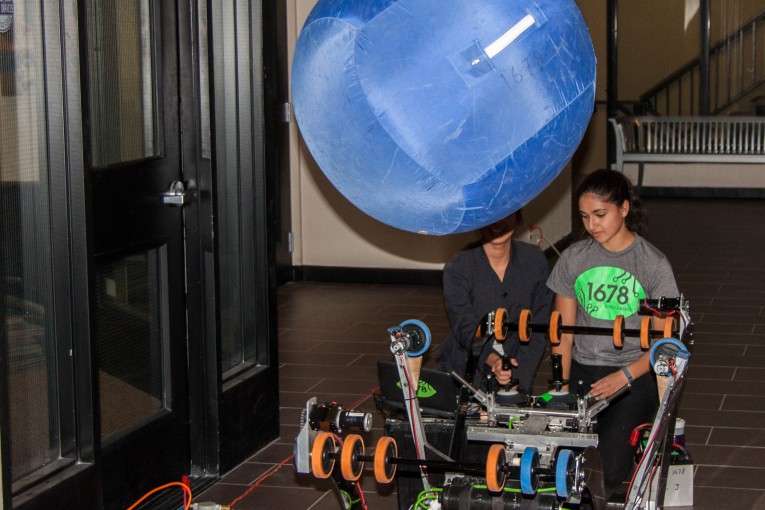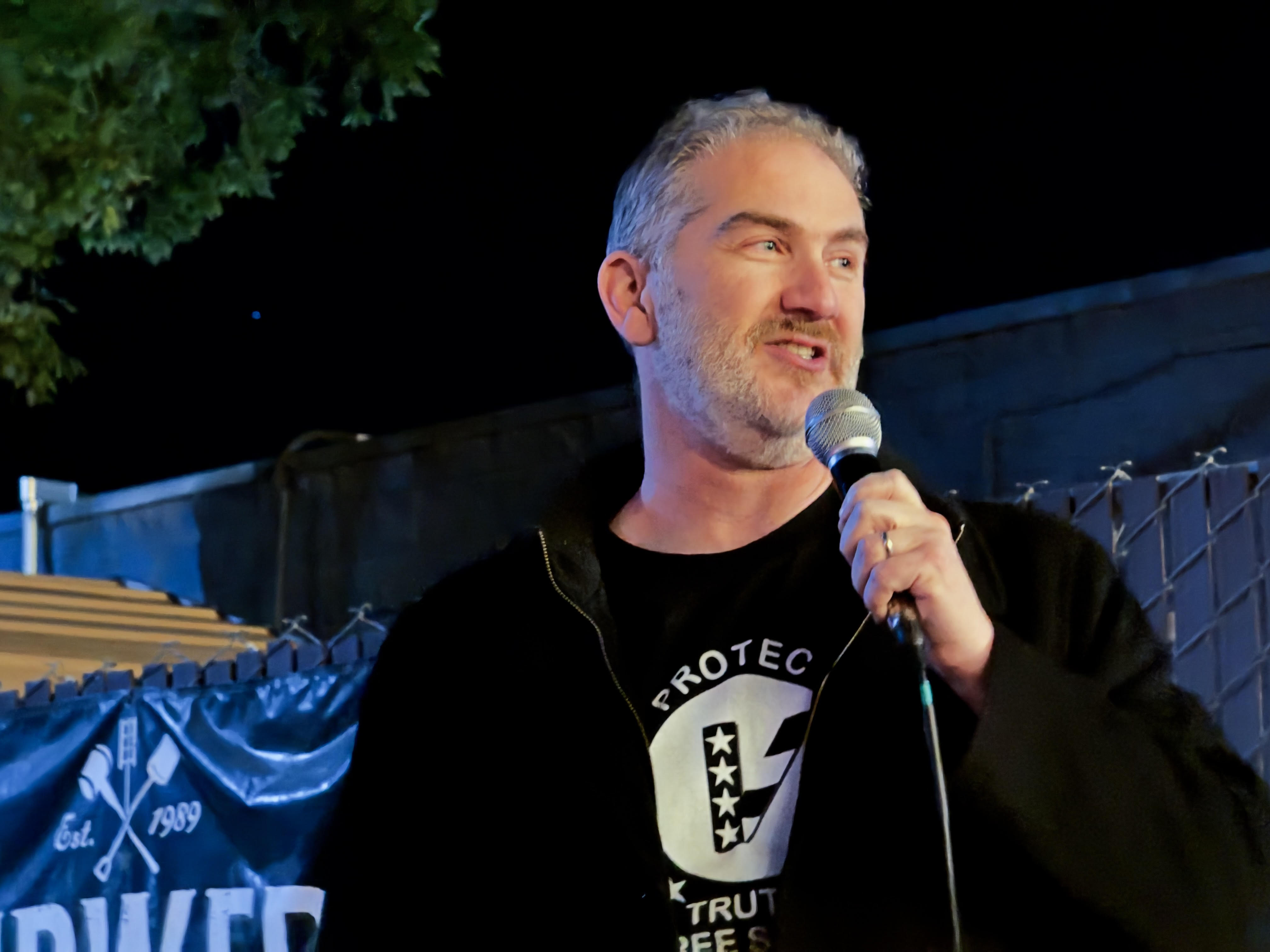

The venue of JumpStart moved this month to the newly-opened Pollinate Coworking space at Regency Square, located at 508 Second Street. The event drew a good audience to hear four presenters.
The JumpStart event switched locations this month in order to accommodate a robotics demonstration by “Citrus Circuits,” a FIRST robotics team based out of Davis Senior High School, which includes students from Woodland Christian, Da Vinci Charter Academy, and Davis Senior High School.
Presenters this month included Citrus Circuits captain Elise Wong, Niki Peterson from the Child Family Institute for Innovation and Entrepreneurship, Mike Fee from the Spotlight Education, and Anya Simmons, the director of Camp Kesem.

Anya Simmons from Camp Kesem explained that it is a “camp for kids whose parents had or have cancer.” They are not technically a startup, as they have been around for ten years. Everything that is done locally is done by UC Davis students.
“Our mission is twofold: we’re supporting these kids who… at home don’t really have the support that they need, they’re friends don’t really know what they’re going through.” The program allows them to “just be a kid for once, not worry about their parent’s illness.”
But the program has another component, “and that’s about developing critical leadership skills for these kids.” They plan, fundraise, as well as recruit campers and counselors.
Ms. Simmons explained that there are 1.7 million cancer cases per year, which leaves 3.8 million children in the US coping with their parent’s illness.
Camp Kesem was founded in 2001 at Stanford under Hillel. Camp Kesem in 2014 supported almost 4000 campers nationally. Locally they served 112.
“That’s not a lot,” Ms. Simmons said. “This is definitely an underserved community.”
The camp is a typical summer camp during the day with activities. But at night, in the cabins, they sit down with the campers and have them open up about what is going on at home.
There are 58 counselors at Camp Kesem Davis, and many of them have had parents who had cancer themselves. This year they will exceed 140 campers with a budget of just under $100,000.
“A lot has gone on this year to completely change what Camp Kesem is,” she explained. “We’ve grown to two separate weeks of camp.” That makes them the first Camp Kesem to have two separate camps. “It’s going to be something totally different, but it’s very exciting.”

Niki Peterson from the Child Family Institute for Innovation and Entrepreneurship explained that they are housed in the Graduate School of Management in UC Davis. They are a small company that helps scientists and engineers commercialize their research.
She explained that the “Child Family” name is a bit confusing as “we’re not a day care.” Instead, “through a very generous donation of Mike and Rene Child, both alum of UC Davis, they endowed our institute, hence got the naming rights, their last name is Child, so it has the Child Family name.”
She said, “It’s challenging for marketing but we’re very grateful for their donation.”
The flagship program they started was the Business Development Fellows program, and “this is where we take a cohort of nine engineers and scientists, we bring them into the graduate school for an entire year, they take five courses alongside the MBA students and really dive into the aspects of entrepreneurship and innovation, based on the technology that they’re working on in the laboratories.”
Instead of simply having people do research and enter academia, “We actually want this stuff out into the marketplace to change the world for the better,” she explained. “Especially because UC Davis, our core competencies touch humanity on very basic level.”
Agriculture, bio-med, and vet-med are some of UC Davis’ core competencies, she said, noting that UC Davis was recently named the top Vet Med School in the country, again this year. “That’s really what we focus on,” she said.
They also have entrepreneurship academies. These are three-day intensives, where they bring in 40 to 60 scientists and engineers. “Now entrepreneurship is very interdisciplinary and it touches all different aspects,” she said. There is worldwide participation at these academies.
This is a very different perspective “because most scientists are not involved in business, but we actually need them to get involved.”
Niki Peterson said that a lot of people want to know how many companies they’ve started. However she said, “We measure our success a bit differently, because not only do we help companies start, but we help people find different avenues. Perhaps it’s not something where a scientist wants to give up tenure and start a company but they can license their technology or we can pair them with an MBA student who wants to do the work of starting a business they just don’t have the technology or the expertise.”
“So you can pair those people together and we can make those connections,” she said. “It’s truly exciting to see.”

Mike Fee from the Spotlight Education asked who has heard of common core – everyone raised their hand. When he asked what they think when they hear common core, some said controversy.
He then said, “Who has heard of the Smarter Balanced Assessment? It is the assessment that kids are taking this year that is aligned to the common core, also the source of a lot of controversy.” He then asked about the CAPS.
“What all of these things have in common, aside from the fact that there is some controversy, is that the reports that come out of them (are) really really bad, not very informative at all. Don’t tell you much about how you kid really informed on the assessment. Really don’t tell you how much your kid has actually learned at school.”
“Spotlight has been set up to use technology to solve that problem,” Mr. Fee explained. “We create not reports, not even dashboards, but articles that read like USA Today or articles about your kid or your kid’s school or the school district.”
“We can take any set of data, analyze it, and convert it into something that reads like a newspaper article,” he said. “We automate the analyze, we use what we call the mail merge on steroids, we turn that data into real text that anyone can understand and then we use a graphical engine to lay it into something that looks like an article that’s going to be targeted at the user.”
“What the teacher gets is not the same as what the parent gets,” he said.
Mike Fee used to be a teacher, he believes that there is too much at stake and that we are using too much time and energy and bandwidth educating our kids and testing them, “not to be able to understand the data that is coming out of all of this.”
The next step, Mr. Fee said, will be a video that tells the parents how their kid did on the test. It will be accessible by phone or computer or any device.

Elise Wong, a Davis High School Student, is the captain of the robotics team, Citrus Circuits, the local robotics team. “Our main goal is to basically combine project based learning and competition to allow our students become innovative thinkers and fuel passionate student involvement in robotics.”
FIRST is a non-profit organization which stands for For Inspiration and Recognition of Science and Technology. The mission of the organization, which sponsors national robotics competitions, is to inspire young people to be science and technology leaders, by engaging them in exciting mentor-based programs that build science, engineering and technology skills, that inspire innovation, and that foster well-rounded life capabilities including self-confidence, communication, and leadership.
Every year they get a new game or challenge and they only have six weeks to build a robot to play in that game. They have access to industry standard machinery and they get to work with skilled mentors along the way.
After six weeks they go into a competition. Last year they won two of the three regional competitions. That qualified them for the championships where they got second place. This year they’ve won all three of their regionals. Next week they go to championships again.
They don’t just have competitions, they also now have an advanced robotics class at Davis High School. “Next year, we’re looking forward to having more than 100 students in introduction and advanced robotics courses.”
This also requires funding. This year they’ve raised $120,000 which goes to building their robot, travel fees, and purchasing capital equipment. Their main financers include UC Davis, DJUSD, and FMC Technologies.

—David M. Greenwald reporting

the cottage industry that all of these tests produce – no one can really understand the results. is this really how we want education? at the point where we force third-parties to dumb down the results?
somewhere frankly is smiling
““We actually want this stuff out into the marketplace to change the world for the better,” she explained.”
The only thing that I can think of that would be better is if we could put all this stuff our for free so that everyone could have access to the information and ideas, not just those who are situated so as to make a profit from it.
I wonder if that has put a frown on Frankly’s face. We’ll soon see.